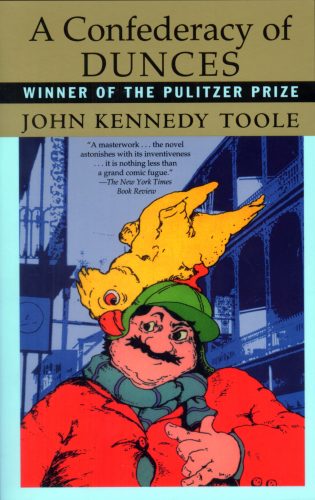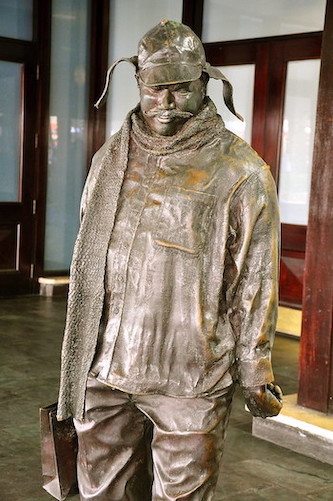Book Reconsideration: “A Confederacy of Dunces” — Still an American Comic Masterpiece?
By Matt Hanson
A reassessment on the 40th anniversary of A Confederacy of Dunces, a novel that many consider one of the funniest ever written by an American.
A Confederacy of Dunces by John Kennedy Toole. Forward by Walker Percy. Grove Atlantic, 416 pages, $16.

Right at the beginning of A Confederacy of Dunces we immediately know what’s up: “A green hunting cap squeezed the top of the fleshy balloon of a head. The green earflaps, full of large ears and uncut hair and the fine bristles that grew in the ears themselves, stuck out on either side like turn signals indicating two directions at once…. In the shadow under the green visor of the cap Ignatius J Reilly’s supercilious blue and yellow eyes looked down upon the other people waiting under the clock at the D.H. Holmes department store, studying the crowd of people for signs of bad taste in dress.”
The first page is one of the great opening paragraphs because it quickly and subtly establishes so much about the story to follow: we see the oddly named Ignatius J Reilly, our antihero protagonist’s massive and disheveled physicality, his pride, his snobbery, and the knowing detail of the only place he could ever possibly stand to live in, which is The City that Care Forgot. The fact that there is a life-size statue of Reilly slouching today in that exact spot, glaring in perpetual suspicion at the bad taste of all the tourists and Quarter characters who are always milling around Canal Street, tells us how well author John Kennedy Toole knew his turf.
I’m a new resident of the Crescent City, and coronavirus concerns have irritatingly kept me from being able to explore the city as much as I’d like to. But even with my limited experience, reading Confederacy gives off a sense of the whole New Orleans vibe: all that glorious appetite for food and drink, the funky music, unique architecture, the delight in self-expression, the festivals, the sultry heat, those magnificent oak trees, and the shabby genteel style of self-presentation that would be far less enticing in a place that wasn’t as deeply committed to consuming all the pleasures the good life has to offer.
Toole’s life story is compelling for a number of reasons. The biggest is probably because Confederacy, his only full-length novel, came very close to never being published at all. If it weren’t for Toole’s indomitable mother spending years knocking on every possible door to finally get her son’s lost masterpiece published, and respected local author Walker Percy finally reading the smeared manuscript, the Pulitzer-winning book would never have seen the light of day. Poor Toole had everything going for him most of the time — wit, education, charisma, talent — but in the end his private demons and public disappointments got the better of him.

Author John Kennedy Toole
Confederacy has gradually gained the status of a beloved cult classic, the kind of book insistently pressed on you by enthusiastic fans. The blurbs on the back cover are the kind every author dreams of getting, hailing it as a masterpiece and one of the funniest books of all time. Reilly is the kind of character who people like to use as a metaphor. I’ve met many people who are compared to him — and a few people who are a lot like him but don’t have anyone around to tell them so.
Among the many vivid supporting cast, the character of Burma Jones stands out. Jones is an African American fellow who works a janitorial job at a particularly dingy spot in the Quarter only to avoid getting picked up for vagrancy. He wears dark glasses wherever he pleases while exhaling various clouds of cigarette smoke wherever he goes. Jones’s sarcastic vassalage in the Night of Joy saloon especially resonates these days when systemic racism is on everyone’s mind. Jones knows perfectly well what he’s doing when he refers to the ditzy bar owner as “Scarlet O’Horror” — and it’s not just because of his local accent.
Part of what makes Reilly so memorable as a satiric character, a self-styled intellectual who lives with his mother and smells horrible and gets off on his constant indignation and horror at the modern world, is the classic trope of the scold who has no idea how ridiculous they are. (The archetype in Western lit is Moliere’s Misanthrope.) Reilly thinks he’s always being perfectly reasonable, of course, while he bloviates and belches and causes a distinct kind of merry hell for everyone around him. A subtle sympathy is even generated, given how often Ignatius remarks about how wounded he is and how distraught his nerves are by all the things that he goes through. His “valve” tends to snap shut in disgust whenever his expectations go awry, and releases noxious fumes the way a skunk does, both in self-defense and as self-assertion.
At this point, I must make a confession. As well-written as Confederacy often is, it’s never quite won me over to the same level of adoration shared by others. The first time I tried reading the book was my first or second year of college, on someone’s enthusiastic recommendation. Chuckled from time to time, but my overall reaction was an overwhelming feeling of — so what? Ignatius seemed more boorish and obnoxious than anything else and I struggled to reach the admittedly lovely ending. I didn’t have the heart to tell the person who recommended it to me that Confederacy was a dud as far as I was concerned. I kept my reserved opinion to myself whenever other people enthused about it, which was pretty often.

Statue of Ignatius J Reilly, which stands outside of the former D.H. Holmes Department Store in New Orleans, where the first scene of the book also takes place.
Having moved to New Orleans recently I decided to give Confederacy (now turning 40) another shot. The book went over much better the second time around. I appreciated Ignatius’s sputtering misanthropy much more after all these years. Maybe time embitters you; human folly does become increasingly exasperating the longer you’re forced to contend with it. This goes double when institutional stupidity ends up having real-world consequences and isn’t merely something that happens to bother you personally. Sooner or later you just have to develop a thicker skin, or your accumulated annoyances threaten to drive you mad. A sense of humor helps quite a lot. And to some extent we do laugh with Ignatius and not just at him; we all know on some level that the world around us pretty much sucks: all the cheesy art, the brash stupidity, the brazen corruption, the blithe vanity, and outright buffoonery masquerading as authority. It’s enough to make your valve snap shut for good.
As a slobby bookish type myself, I won’t dare judge Ignatius’s lifestyle choices. Maybe the reason why I don’t love Confederacy is because in some ways the story hits too close to home. In a macro sense, the problem Toole points out has become worse. There are a ton of loudmouthed little Ignatius types — a confederacy, if you will — wandering around right now, and some of them are heavily armed. Social media is chock full of outraged trolls of some type or another, loudly bellyaching about this or that, outraged that the world won’t stop in its tracks to recognize their self-appointed right-thinking genius. You can tell them by how quickly they alternate between cringing victimhood and a stubborn sense of entitlement. Behold the worst of both worlds — the people are outraged, they demand to be heard, quickly reveal that they have nothing to say, and then are furious at being denied the validation they secretly crave.
I wasn’t grossed out by the constant jokes about how fat Ignatius is or the descriptions of his constant farts and belches or the many situation-style gags where our hero gobbles down an entire cart of hot dogs or is attacked by a parrot. Still, many scenes here were probably intended to be more outrageous and cartoonishly amusing than they are. Ignatius is comic because he hates everything around him and yet he doesn’t realize that the joke is ultimately on him. That’s definitely a funny premise, as far as it goes. But, given the fact that he’s a New Orleanian, he is gifted with more of an opportunity to dive into life’s brief revel than someone living in, say, South Dakota. The egomaniacal consolations of misanthropy can ultimately only take you so far in life — at some point, you’ve just gotta chill out. If you find that you aren’t capable of having a merry time in old New Orleans of all places, where the living is easy, then maybe you should conclude that your misery is just your own damn fault.
Matt Hanson is a contributing editor at the Arts Fuse whose work has also appeared in American Interest, Baffler, Guardian, Millions, New Yorker, Smart Set, and elsewhere. A longtime resident of Boston, he now lives in New Orleans.
Tagged: A Confederacy of Dunces, John Kennedy Toole, Matt Hanson


I re-read COD about a year ago, and I was a bit less amused. I suppose there’s nothing like the first time for a novel like this–sort of like the second or third time you watch a farcical movie like “Ghostbusters.” (Bill Murray would be a good choice to read the audiobook of COD.) I thought it was hilarious when I first read it in college, just like you. As a jaded adult, some of the sight gags and situational comedy seemed a bit dated and flat. But I’ll always have a soft spot for any character who uses Boethius and “that slut Fortuna” as the antagonist! It’s gratifying to know that Ignatius has earned a permanent place in the cultural mythos of New Orleans. Things like that don’t happen often, and this time it was for all the right reasons.
I read COD 40 years ago and again about 20 years ago, and the article makes me want to read it again in the near future. It’s still my favorite novel (comic and beyond). But what makes any person laugh is, well, personal. For its biggest fans I recommend Cory MacLauchlin’s biography “Butterfly in the Typewriter” about Toole’s too-short life.